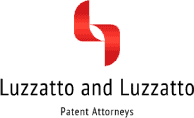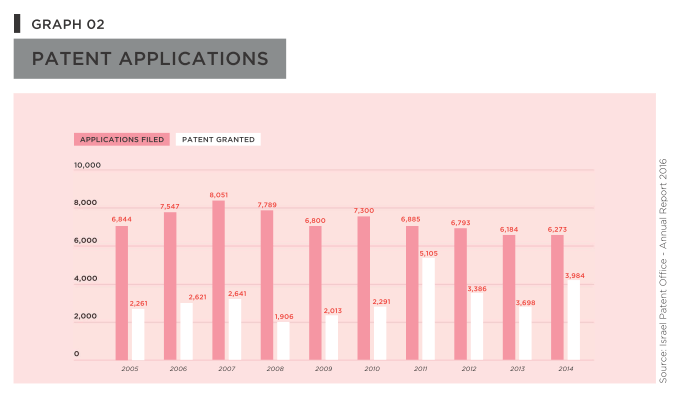
Intellectual Property in Israel in 2018: Legislation, Work Environment and Output


In this era of technology and innovation, intellectual property is considered one of the most influential areas for economic growth of corporations and countries. Intellectual property law has become a central branch in the world of modern law and its contribution to the development of the society and economy is growing. Correct and intelligent management of intellectual property rights, among them patent, trademark and design rights, strengthens the array of incentives for inventors and producers and constitutes a significant growth engine in the country’s economy. This field has special importance in the Israeli economy which has a technological orientation and in which nearly half of exports depend on technology products and services.
In recent decades the field of intellectual property has been undergoing intensive processes of globalization and as always is very much influenced by technological and legal changes. The penetration of the internet and social media into every aspect of our lives has made intellectual property more economically important than ever, but also presents intense challenges, such as protecting copyright on the internet and monitoring enforcement.
Moreover, countries and governments are more and more coming to understand the economic importance of intellectual property and adjusting their methods for calculating GDP accordingly. Thus, for example, in 2013 the U.S. government made a radical methodological change, that takes place on average once every five years and earned the nickname, “the Olympics of economic numbers”. The main goal of the new calculation was to provide a more accurate reflection of the modern economy, which relies more and more on distribution, consumption and production of intangible products. The U.S. is the first country to implement the new international standard.
The most significant change is increasing the weight given in the index to innovation and different kinds of intellectual property. This change was implemented because to date, the GDP index has not sufficiently expressed the trend of transition to a knowledge-based economy in developed countries. Thus the new formula counts spending on research and development as investment, and likewise the creation of intellectual property assets such as books, films, television programs, music, etc.
Legal and Regulatory Infrastructure
In light of the unique characteristics of intellectual property, its growing importance in international trade, processes of globalization and technological development, there is great importance to the legal framework that constitutes the legislative and regulatory infrastructure for protecting intellectual property rights.
Israel, as a significant, quality player in the global technology market, has taken upon itself in recent years to adjust its norms of conduct in all matters related to intellectual property – including its local laws, regulation, and its enforcement regime – to conform with those accepted in the developed world. This followed a period of many years in which Israel was relatively backward in contrast to developed countries and was even placed on an uncomplimentary list of countries under strict surveillance for violation of intellectual property rights.
In recent years Israel implemented the following steps:
- Changes and reforms in the Patent Authority, including turning the Authority into an executive agency and a significant increase in personnel to handle applications for patent registration, with significant professionalization of the work force;
- Amending local law to conform with binding international conventions such as the Madrid protocol and the Global PPH;
- Joining the OECD and making amendments to intellectual property law;
- Strengthening the enforcement regime against counterfeiting and smuggling counterfeit merchandise.
One of the positive results of the efforts Israel has undertaken was expressed in its international rating in the field of intellectual property. In framework of the special report called the Special 301 Report prepared by the Office of the United States Trade Representative from 2016, Israel was taken off the Watch List of countries under special surveillance. This status was maintained in the 2017 report. We note that in prior years Israel was not only placed on the list of countries “under surveillance”, but also on the uncomplimentary list of countries under strict surveillance (the Priority Watch List).
We will discuss below in detail the main changes and improvements that Israel has conducted in the field of intellectual property:
Upgrading the Intellectual Property Registration Function
The first, most basic contact of entrepreneurs, inventors, companies and corporations when they come to seek legal protection for their inventions is with the government body in each country responsible for registration of patents, designs and trademarks. The quality of the work of this body significantly and clearly impacts the willingness of these entities, including outside investors, to operate in each country and clearly impacts the scope of industrial and technological development in the country.
Up until about a decade ago, the process of registering patents in Israel suffered from unwieldiness and bureaucratic delays. While the length of time required in Israel to register a trademark or design (model) was reasonable (usually between one year and eighteen months), the length of time required for registering a patent was long (more than four years on average, while registering certain patents took even longer). When we take into account the life of a patent (20 years), it can be understood that the delay caused material damage to the rights of patent applicants in Israel.
The delay in the work of the Patent Authority stemmed in essence from a shortage in personnel to perform the job of examining patents. Training patent examiners is a task that indeed takes a great deal of time and requires resources; however, different countries have taken very decisive steps to strengthen their patent authorities. Thus, for example, the European Union established the European Patent Office, which is an external organization that is not supported with funds from the countries but rather is self-funding, through fees paid by patent registration applicants. The organization even recruited hundreds of patent examiners and trained them for the job in an organized work plan that took several years.
Israel was required, therefore, both because of its objective situation and because of the commitment it took upon itself on the international legal and commercial plane, to advance a significant reform in the Patent Authority, organized by the Ministry of Justice, which is responsible for registering intellectual property.
Indeed, in 2006 the government decided that the Patent Authority would operate as an independent executive agency headed by the Patent Registrar. In 2011, this status of the Authority was first anchored in legislation. The significance of this move was that it provided the Authority with administrative, budgetary and organizational independence, both in areas under its specific authority and also in areas of finance, budget and human resources.
During 2014, the Patent Authority first began to serve as an authority for international search and examination for Israeli and foreign patent seekers. At the beginning of 2014 an agreement was signed with the U.S. Patent and Trademark Office according to which, beginning in October 2014, the Israeli Patent Authority began to operate as a search and examination authority for international patent applications that were submitted to the U.S. Patent Office. In this agreement, patent applicants from the United States were given the option to choose the Israeli Patent Authority to conduct searches for them as one of the certified International Search Authorities.
In accordance with the agreement and so as not to harm the queue for examination of national applications from the United States, in the first stage it was agreed that the Israeli Patent Authority would examine up to 75 American applications per quarter in order not to become overloaded. In addition, since in Israel it is not possible to examine applications in the field of business methods according to the definition of the G06Q classification of international patent classifications, it was agreed that at this stage this type of applications would not be examined. Through the end of December 2014, nine international search requests were received from patent applicants from the U.S.
Advanced Accessible Services
As the regulator of the field of industrial intellectual property, the Israeli Patent Authority is responsible for promoting laws and regulations in its field. Over a five-year period there has been an increase in the Authority’s activities. Thus, for example, a new design law was advanced that is expected to bring about a significant change in the field of design in Israel. The Authority expects that through advanced and accessible services it can contribute to the formation of a strong, valuable design registration right from which designers and the general public can benefit.
The Patent Authority has leading international status derived from increased use the international tools that the Authority makes available by Israeli registration applicants. The Authority has wide-ranging connections with leading patent offices around the world. In recent years, a number of new cooperation agreements have been signed on the topic of arrangements for expediting the PPH examination (see below) as well as agreements for Patent Authority operations as an International Search and Examination Authority for American and Georgian patent applicants. In addition to these agreements, a memorandum of understanding was signed for cooperation with the National Institute of Patents and Information in Tajikistan, initiating the first ever cooperation between the two offices.
Over the past two years, the Authority has hosted many delegations, among them a senior delegation from the Chinese Ministry of Commerce, with whom the Ministry of Justice signed a memorandum of understanding; representatives from the French Patent Office for a discussion of future cooperation, including in the field of designations of origin and geographical indications; a delegation from the United States Patent and Trademark Office in the framework of training on the CPC system; representatives from the Denmark Patent Office who took part in a forum on intellectual property of the Department of Justice, hosted by Patent Authority; as well as a senior delegation led by the Deputy Mayor of Shanghai who is responsible for intellectual property in the region.
The Authority also has influential status in the World Intellectual Property Organization (WIPO) and organizes many activities with the WIPO throughout the year, such as events to raise awareness about employment opportunities for Israelis within the WIPO that have taken place in academic institutions, and the Israeli Conference on Intellectual Property hosted together with the AIPPI organization, in the framework of which the CEO of the organization visited Israel. For five years the Authority has organized a prestigious course, together with the WIPO, for patent examination in the field of pharmaceuticals. Examiners from leading patent offices are invited to this course each year.
Increasing Efficiency and Output
As a regulator, the Authority is constantly in a process of self-examination. It is no coincidence that the Authority asked to be appointed among the leading units in the regulatory reform process led by the Prime Minister. Indeed recent years have been characterized by a great deal of activity, shortened wait times and an increase in output in all Authority departments. A key step in increasing efficiency, experienced by the Authority and by the public who use their services, is completion of the transition to full online work in every department of the Authority. In June 2015, the online work system went live for the trademarks department, in December 2015 for patents, in July 2016 for the PCT department, and in December 2016 for the designs department. Each of these systems enables the public to work fully online in all matters related to legal processes dealing with the Patent Registrar in each of these areas.
Indeed, following the steps taken to increase efficiency and output, average wait times for initial examination have decreased. Thus Israel has joined the worldwide trend of decreased wait times for patent application examination. The data show that the average wait time for initial examination decreased dramatically between 2006 and 2014 – from 50.2 months in 2006 to 29.4 months in 2014. This trend also continued in 2015-2016. At the end of 2016, the average wait time for initial examination was 28.5 months, a decrease of approximately 8% from the average wait time in 2015. The average examination duration including patent applications in all the departments decreased significantly compared to 2015 as a result of the effort made to shorten wait times for repeat applications.
In addition, beginning in 2014, further steps were taken to increase efficiency that in addition to increasing output also improved the quality of examination. Among these steps, we note the improvement in the examination instructions as well as the operation of a new incentive salary structure in the department. These steps led to a meaningful decrease in wait times for re-examination, as a result of which more applications arrived at the acceptance stage earlier than in prior years.
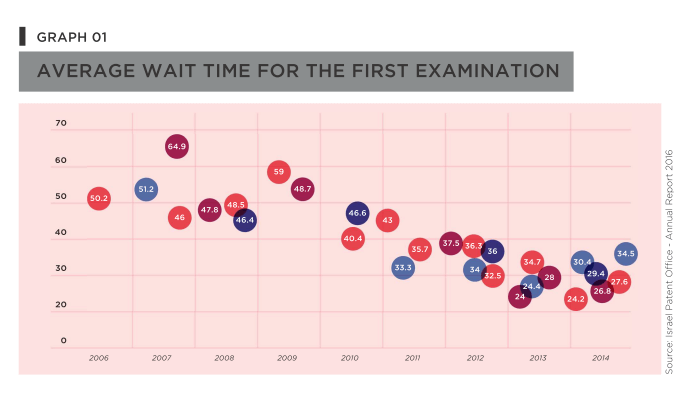
For 2016, a decrease of approximately 7% was predicted in applications for patent registration submitted in Israel, and conversely a continuing trend of increase in the number of patent acceptances can be seen since 2011. The number of applications whose examination is completed through to granting of the patent has grown consistently since 2011. In 2015, an increase of 9% was predicted in the number of patents granted compared to the previous year. This increase can be attributed to the preference that was given in the past year to completion of processing of applications whose examination had begun more than five years ago. In addition, in 2016 the process continued of sending refusal notifications for applications that had gone through four rounds of examination and had not met the conditions for acceptance. As a result of this, more applications reached the acceptance process earlier than in prior years. In addition, the publication of new guidelines regarding the article in the Patent Law dealing with medical treatment of humans led to a decrease in the number of deficiencies and a decrease in the amount of correspondence that had been conducted on this issue. Likewise, the number of applications that were expedited in the framework of the PPH track increased and as a result of this, the number of patents granted also increased.
Additional Improvements
In 2014, comprehensive activity was initiated in the Patent Authority to identify professional gaps that needed bridging. In accordance with this, a multi-year training program was built, with an emphasis on building and maintaining knowledge in the patent examiners department.
Advance Publication
The Israeli Patent Authority has adapted itself to international standards and in accordance with the Amendments to the Patent Law of July 2012, a patent application shall be open for online inspection eighteen months from the date it was submitted (or from the date from which its right of priority derives).
Certification as an International Examination Authority
As stated, one of the prominent achievements of the Authority was achieving certification to operate as an international search and advance examination authority for international patent applications, in the framework of the Patent Cooperation Treaty (PCT). This certification – granted by a decision of the World Intellectual Property Organization (WIPO), an agency of the United Nations, in 2009, established Israel’s status among nations promoting international projects in the field of intellectual property, and constitutes important international recognition of Israel’s abilities in the field of technology.
The new service operations provide a more effective and inexpensive solution for the increasing international needs of Israeli patent applicants. Prior to this change, international applications submitted by Israelis were examined by international search and examination authorities in Europe and the United States, according to the applicants choice. The change made it possible to examine applications in Israel, in a way that is comfortable, inexpensive and accessible for Israeli applicants. Simultaneously, the Authority increased personnel recruitment in preparation for the Patent Authority becoming an international authority for advance search and examination.
Green Applications
The Israeli Patent Authority has aligned with a large number of western patent offices in the context of policies to encourage patent applications for “green” inventions that contribute to preserving and improving the environment. The examination of patent applications that meet the criteria published by the Patent Authority, and that are classified as green, will begin three months from the date of classification.
The PPH Program
During 2012, the Patent Authority renewed its cooperation with the United States Patent and Trade Office (USPTO) in the framework of the PPH (Patent Prosecution Highway) which began as a pilot in 2011. In August of that year, the Patent Authority and the USPTO expanded their cooperation as part of this program and began the PCT PPH pilot
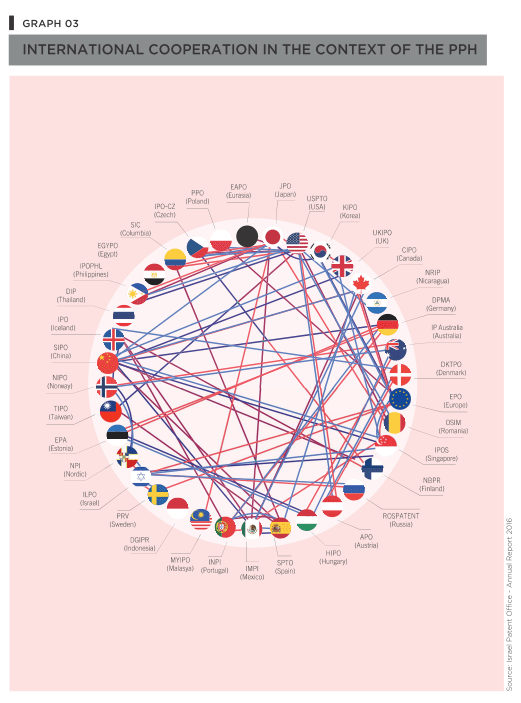
The PPH program is a campaign to expedite and improve processes of patent examination through cooperation among patent offices around the world. Under the PPH pilot, a patent applicant who has submitted applications in two countries is permitted to request a shortened queue for examination of the application in the second country after receiving a positive examination report in the first country. Thus the PPH allows patent offices that participate in the program to rely on work that has already been conducted by other patent offices and thus to reduce workload and shorten the queue for examination.
In addition to this arrangement, in 2014 the Authority promoted signing PPH agreements that take advantage of work products that have been created in the framework of the International Search Authority (PCT PPH). The Patent Authority has PPH and PCT PPH arrangements with the patent offices of the United States, Finland, Denmark and Japan, and in 2014 the Authority also began PCT PPH arrangements with the patent offices of South Korea, Spain and China. In addition, in December 2014 an agreement was signed with the European Patents Office, regarding initiating a pilot for a PCT PPH arrangement that will begin in January 2015 for a period of three years.
International Cooperation
In recent years the Authority has continued to intensify cooperation with international offices and bodies, as stated above, as well as with academic institutions and members of the Israeli public seeking patents.
Adapting Local Legislation to International Conventions
In recent years, Israel made a series of legislative amendments in order to adapt the procedures for treatment of intellectual property to those accepted in developed countries and to international treaties and conventions to which Israel is a signatory. Among other changes, the patent regulations were amended to conform with the treaty for cooperation in patent matters, adding new methods for application submission, for example on computer storage devices (CD or DVD), or via the internet.
The amendment also addressed the PCT department’s treatment of requests for right of priority at the time of submission of international applications and established the procedure for submission of right of priority documentation through the PCT department. The amendment enables patent applicants who submit international applications electronically to also submit right of priority documentation electronically.
The Madrid Protocol
In July 2010, Israel joined the international agreement for trademark registration in the framework of the “Madrid Protocol” and beginning September 1 of that year, the date on which the agreement became valid in Israel, Israeli applicants were able to submit international trademark registration applications and to claim trademark protection in other countries based on Israeli trademarks.
We note that a new system has not yet been established according to the Madrid Protocol. Each entity that is interested in registering its trademark in foreign countries is forced to conduct a separate, independent registration process in each country. The matter forces trademark holders to employ the services of a lawyer or local attorneys in each country and to bear the significant costs, which make it difficult to build an effective and optimal portfolio of trademarks in all the entity’s target countries. In practice, the Madrid mechanism significantly shortens and simplifies the process of trademark registration in a variety of countries. In other words: the agreement has made trademark registration and protection for brands easier and cheaper.
The participation of Israel in the Madrid system aligned Israel with the other countries in the protocol, while introducing a number of changes in the practice of trademarks in Israel, of which the key changes are:
- It is now possible to submit an application for trademark registration for several kinds of merchandise or services simultaneously (while previously separate applications were required to be submitted for each kind of product and/or service).
- A trademark is valid for ten years, and upon expiration it is possible to renew it for additional periods of ten years each (without limitation).
Israel’s entry into the Madrid Protocol brought about a dramatic increase in the number of applications for trademark registration and in 2014 the trademark department in the Patent Authority was still continuing to cope with the heavy workload following the increase in the number of kinds of applications submitted in Israel for trademarks through international applications under the Madrid Protocol. Despite this, the department met the objectives that were set by the committee for setting and monitoring objectives for the Patent Authority.
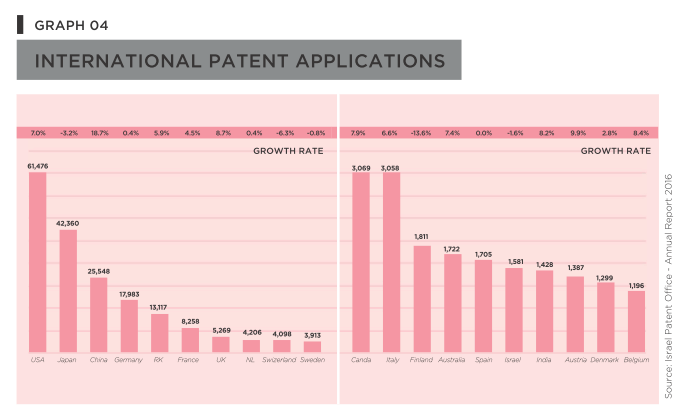
During 2016, the department fully implemented a new online work system that was started in 2015. Currently most of the applications and inquiries are submitted as required by trademark regulations.
In 2016, there was a decline of 11% in the number of trademark registration applications. The number of national applications declined by approximately 7.8% while the number of international applications submitted dropped by 13.6%. It is important to remember that up until September 2010, only one-type applications could be submitted. Beginning in September 2010, when Israel began operating in the framework of the Madrid Protocol for submission of international trademark registration applications, it became possible to submit multi-type applications. Therefore, this graph does not fully express the increase in the scope of the department’s work. For a more exact picture, we can look at the following graph that presents data about the amount of different types that were submitted and registered.
Alongside the decrease of 11% in the number of applications submitted, a sharp decline of 16% was registered in the number of types that were submitted. It is evident that after 2015, which was a record year in the scope of applications and types, the number of applications returned to the level of prior years. It is possible that this decline can be related to the comparatively long examination period in Israel.
Joining the Organization for Economic Cooperation and Development (OECD)
In September 2010, after 15 years of negotiations, Israel joined the prestigious Organization for Economic Cooperation and Development. This was the climax of focused Israeli efforts, achieving a strategic objective defined by the Israeli government in 2000.
The OECD unites countries from around the world with developed economies and its goal is to increase cooperation among countries, while meeting international economic standards. This organization sets high standards in all matters concerned with preservation, supervision and oversight of intellectual property rights. In fact, one of the conditions for Israel joining the organization was closing gaps in this area on the part of Israel. The Secretary General of the organization, Angel Gurria, who visited Israel in January 2010, discussed the topic of intellectual property as one of three problems that delayed Israel’s acceptance into the organization.
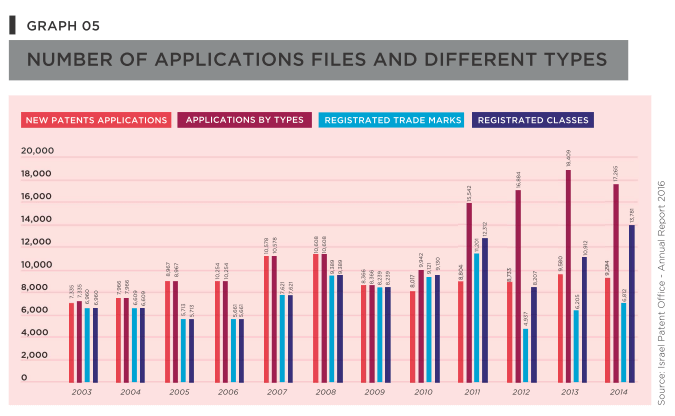
Israel’s acceptance into the Organization for Economic Cooperation and Development constitutes an important milestone in Israel’s integration into the global economy, expressing Israel’s commitment to maintain advanced international standards, including in the field of intellectual property.
Strengthening the Enforcement Regime Against Counterfeiting and Smuggling
Strengthening the enforcement regime against counterfeiting and smuggling of counterfeit merchandise requires granting authority in the field to customs employees. Currently, employees of the Customs Administration enforce the legal conditions of import and export, deal with prevention of illegal activities (fraud, drugs, money laundering, intellectual property), and supervise all imports to Israel and exports from the country. One of the powers of the Customs Authority is to seize goods used in the commission of a crime, or that are suspected as such, including in crimes in the area of intellectual property.
Across the world in recent years, the penalties imposed on smugglers of intellectual property products have become more stringent. In Europe, for example, a law was enacted whose goal is to make an impact in the war against intellectual property violations. The law greatly expanded the powers of the European customs authorities and enabled them to operate independently, without a request from a company whose rights have ostensibly been violated.
In 1995, following an agreement established by the World Trade Organization and Israel’s admission to it, Israel committed to adapt its laws to the requirements defined in the TRIPS agreement by the end of 1999. The Agreement on Trade-Related Aspects of Intellectual Property Rights (TRIPS), including counterfeit goods, is an agreement that discusses aspects of intellectual property rights. Following this, the Israeli law was amended and a comprehensive changes were made to legislation on intellectual property (but not to the Customs Directive). The rationale behind the amendment was to remove difficulties that might arise in international trade regarding intellectual property rights, through paying attention to the need to provide protection for intellectual property rights on the one hand, and on the other hand, the need to ensure that the means of enforcing protection of these rights did not harm international trade. In fact, the law implements most of the amendments required by the TRIPS agreement and as stated, following this amendment to the law, comprehensive legislative amendments were passed dealing with intellectual property. Later there was a change to the Customs Directive that added amendments and different powers for Customs Administration employees.
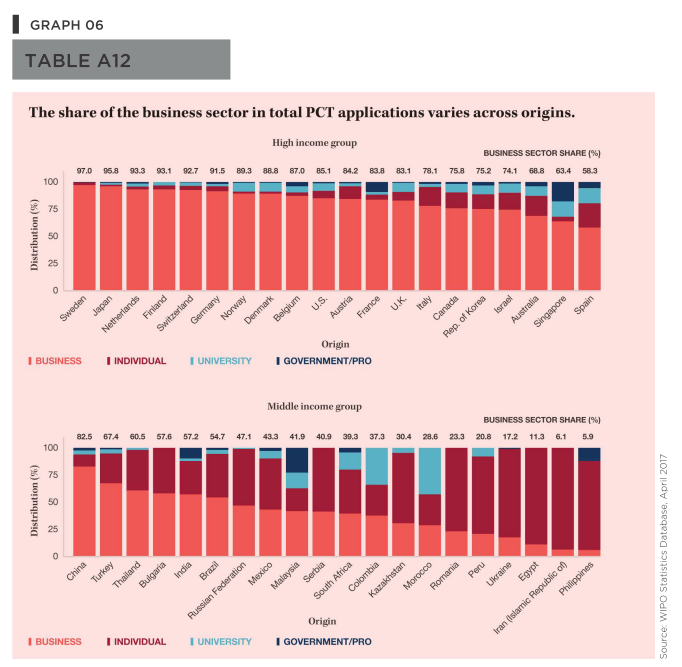
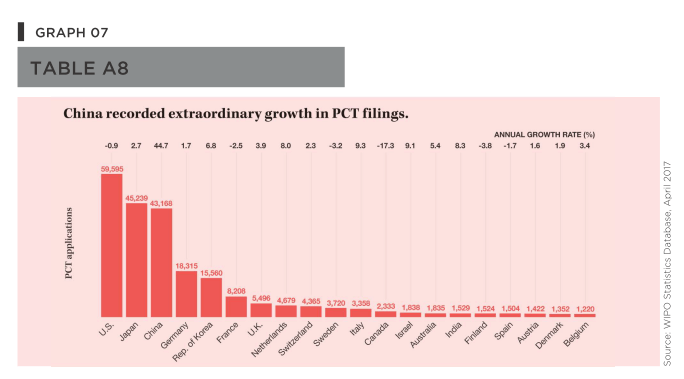
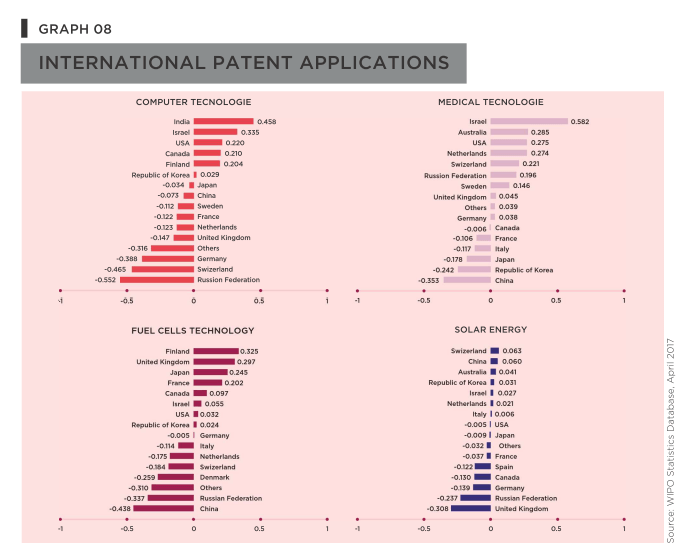
The legislative changes and changes in the powers of customs officials gave intellectual property rights holders tools to contend with violators of their rights. A new path was opened for them to fight rights violators. For example, they now had the option of going to the Customs Administration with notification of violations, and if the Administration was persuaded, by the proof that the rights holder provided, of the apparent existence of a violation of rights, the Administration could treat the imports as prohibited imports. The officials of the Customs Authority were given the authority to detain goods if there was an ostensible violation of copyright or trademark.
International Conventions on Intellectual Property
These are the details of important conventions in the field of intellectual property that are relevant to Israel:
Paris Convention
The Paris Convention deals with a number of significant aspects of intellectual property law, of which the most useful is the “right of priority”. The right of priority allows an applicant making their first application for a patent, design or trademark in a country that is a member of the Paris Convention, to expose the invention, product design or logo publicly for a certain period without fear that another person will copy them and submit a prior registration request in that country or other countries overseas that are members of this convention (over 170 countries), and thus create unfair marketing, commercial or legal advantages. In accordance with the instructions of the Paris Convention, an applicant who submits the first application for a patent has the “right of priority” for 12 months to submit a parallel patent application in one of the countries in the Convention, for which the date of validity will not be the date of actual submission in that country, but rather the date of the initial application submission. This principal also applies with regard to applications for designs for a period of six months, and for trademarks, also for a period of six months.
PCT
The Patent Cooperation Treaty allows extension of the right of priority period for patents of 12 months based on the Paris Convention to 30 (and sometimes 31) months in total, for the same countries that are members of the Paris Convention and that are signatories on the PCT (more than 140 countries). During this period of about a year and a half (known as the international phase), it is possible to receive a search report and professional opinion which usually shows the strengths and weaknesses of the patent application, and enables revision of the application before the end of the international phase. The application then moves on to the national phase, which is the phase of registration of the application in the rest of the countries chosen.
Madrid Protocol
The Madrid Protocol is a convention that allows local trademark owners from member countries (more than 80 member countries) to submit applications for parallel international trademarks in all the other countries in the convention, through one application form and with reduced fees.
Nice Agreement
This agreement deals with classification of trademarks according to 34 different types of products and 11 additional types of services, a total of 45 classifications. Israel joined this agreement in 1961.
Berne Convention
The central convention for protection of copyrights. The directives of this convention establish the prohibition on copying or translation of a work without permission of the author, the prohibition on copying without permission excluding fair use, the prohibition on broadcasting, screening or public recitation of a work without permission, as well as modification, processing or distortion.
Trade-Related Aspects of Intellectual Property Rights (TRIPS)
Intellectual property agreement between countries in the World Trade Organization (including more than 150 countries) that went into effect in 1995. When a country joins the organization, they are automatically included as a party in the TRIPS agreement. The directives of this agreement created a common denominator in intellectual property laws for the member countries in the agreement and these countries must adopt the agreed-upon directives into their local laws within a defined period.
Intellectual Property, Patents and Technological Innovation in Israel
Israel stands out positively in its ranking in the international table of patent applications in fields such as medical devices (ranked first in the world), pharmaceuticals (second place), computer technology (third place), and measuring instruments (sixth place).
Today technological innovation is considered a significant business growth engine.
The goal of business organizations, multi-national companies and company R & D centers – even at the macro level of national economies – is to develop new technologies that will meet the changing needs of the market and the challenges presented by industry; to create sophisticated and advanced products that are leaders in their fields; and to supply systems and products according to client demand that can help them be first in their markets.
There are many ways to measure technological innovation at the national level, such as national spending on civilian R & D, human capital in science and technology, indices of value and economic output in science and technology, scientific publications and citations, and patent registration.
In the chapter before us we examined technological innovation through the prism of creation of new intellectual property and it was measured, among other ways, through the number of international patent applications (PCT) originating in Israel. This is a strong predictor of technological innovation because patent registration precedes production of innovative products. The results of research show that the indicative trends in the field of technology in Israel and the world are reflected, to a large extent, in the data on the number of international patent applications.
We should pay special attention to the following statistic – after a number of years in which the number of international patent applications coming from Israel declined in recent years (and in contrast to the worldwide trend), there was an increase in the number of patent submissions of this kind. Since the number of patent applications constitutes an index that expresses technological innovation, the conclusion to be derived is that it seems that there has been an improvement in the rate of technological innovation creation in Israel, both compared to the past and compared to worldwide trends.
From the data it appears that for 2016 (the last year for which certified data is available), Israel registered 1,838 applications, an increase of 9.1% in the scope of international patent applications originating in Israel, in contrast to a number of years prior in which there was a decline in the scope of international patent applications. Israel has thus succeeded in arresting the downward trend, even registering a substantial increase. As usual, it is worth paying attention to the dramatic growth of China in this context.
An additional statistic worth noting is that among patent applicants in Israel there is weight to both academic and individual applicants, despite the dominance of the business sector.
Israel stands out positively in its ranking in the international table of patent applications in fields such as medical devices (ranked first in the world), pharmaceuticals (second place), computer technology (third place), and measuring instruments (sixth place).

Relevant Articles
Regarding Patent Term Extensions in Israel
